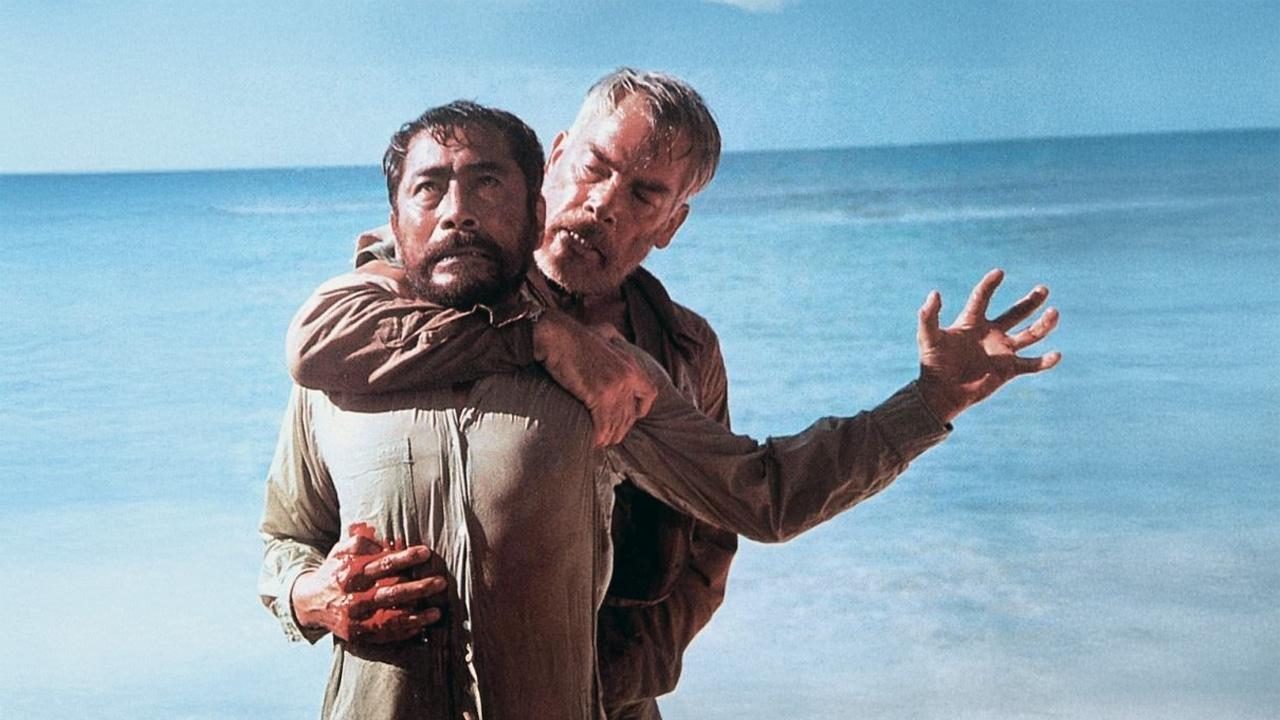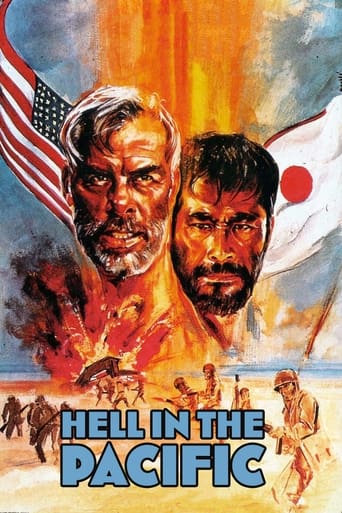

I saw this movie as a teenager and it has always stuck with me as you watch two enemies struggle with their beliefs and looking beyond what they think they know about the other side and even themselves. Great acting, writing and direction! Highly recommend this film!
... View MoreWhen "Hell in the Pacific" debuted, it lost a buttload of money. And, after having just watched it, I can understand exactly why. It's slow beyond belief...and a great cure to insomnia!There really is no context for the film--you just have a Japanese soldier (Toshiro Mifune) and an American (Lee Marvin) stranded on an island during WWII. You later gather that Marvin's character must have been a pilot who was shot down...you know almost nothing about Mifune's. And, for much of the film, they torment and try to kill each other. Later, they call a truce and build a raft and leave. My wife kept saying "I hope they drown" during the raft sequence and I can't fault her. The film ran at a snail's pace and it mostly consisted of the two idiots yelling at each other in their native languages (oddly, they never figured to try to teach the other their language) and this made for a film that practically yelled "Turn me off" because it was so slow and unsatisfying.
... View MoreIn World War II, a shot-down American pilot (Lee Marvin) and the marooned Japanese Captain Tsuruhiko Kuroda (Toshiro Mifune) are stranded in a small island in the Pacific. When they find the presence of each other, the American tries to steal the water provision of the Japanese that protects it, initiating their personal war. After a period fighting each other, they decide to join forces and build a bamboo raft to seek a larger island."Hell in the Pacific" is a good movie about how struggle to survive supersedes any other feelings even in times of war. The Japanese and the American soldiers find how pointless is their fight and resolve their situation joining forces and learning to accept and respect their culture differences despite the language barrier and warfare. Surprisingly they also become friends but the abrupt conclusion is too stupid and meaningless, apparently imposed by the studio. The alternate ending is also terrible but better then the original one. In 1985, Wolfgang Petersen used the same idea in a futuristic environment in "Enemy Mine". My vote is seven.Title (Brazil): "Inferno no Pacífico" ("Hell in the Pacific")
... View MoreIts Difficult with a capital "F" to write a review of this movie. You think "F" stands for frustrating.. guess again. Allow me to explain why this is a a TREMENDOUSLY good movie. Because in its haunting simplicity are revealed the summed up characters of "AWKWARDLY LOOMING NATIONS". Got that? Your character "versus" my character.. YOU AND ME.. right up there on the silver screen. And my my.. ain't we just a lot alike you and me. In this movie we find our daily bread.. my battle with you, whom I have to put up with and tolerate. WHY WONT YOU DO WHAT I WANT YOU TO??? FOR GODS SAKES! What is at stake here is Satre's principle (people are hell). You are my hell. Even when you do what I want you to.. you are my hell. Does man really enjoy suffering? Do YOU... ENJOY.. SUFFERING? Are you ever really satisfied with what you have? Oh yeah? for how long. I see in this movie gobs of really powerful principles at work. LOVE Isn't ENOUGH! I hate to, and am unable to admit I really need you! GOOD GOD MAN! This movie is an exploration into SELF via these two vessel SELVES -> Marvin and the jap guy. I mean I want to scream at the jap and tell him GET REAL WILL YOU? STOP PLAY ACTING! CANT YOU ACT NORMAL! I want to scream at the religious fanatic clowns of this world and tell them the same. GET REAL! STOP PLAY ACTING! Cant you see you're living a role assigned to you by some very rich people that are making a living off of your sweat? and I hate you because you don't see it!!! But how do I wake you up? We live in a society where the people who do the least work make the most money. NO! I Don't NEED SCHOOLING TO KNOW WHAT INSANITY IS. And then as George Carlin put it so aptly "my god has a bigger stick than your god".. which translates to.. Im right you're wrong therefore kindly do what i want you to. But these are power plays.. and roles assigned to US by others like cheap clothes. Yeah.. those clothes you're wearing right now. Oh Mister King.. your "erpidermus" is showing. The king who wore no clothes. YEAH.. I SPELL EPIDERMIS-- ERPIDERMUS.Question is.. what do to about it? And so men go to war for a wealthy few who can pay there way out of war. A long time ago.. you could bribe a priest, rabbi, guru whatever... to give you holy passage clear to the next life.. AND problem is YOU STILL CAN TODAY!!!! Its called a democracy, a monarchy, a 3rd world.. its all the same. POWER PLAYS. I power play you because I don't want to face the self in me that id rather not see. This is what is written in invisible ink here my friends.. right here in this movie. "Its here.. it really is" ring a bell? This is what is written between the lines.. the words that are not spoken and yet.. are spoken here.Here we see our relationship with our self and our relationship with our other self.. YOU. PEOPLE. You who are a part of me.. (you who read this) and from whom I cannot escape nor would I want to. Sooner or later, in this life or the next, we will be here again on this island. You and me.. and we will war.. you and I.So.. what do two men do, who find themselves ""alone"" on an island? do? See those quotation marks.. take a good look at that. So there you are, you're with yourself and with your "inevitable" other self... other people. HELL IN THE PACIFIC IS EVERYDAY LIFE.. IT IS HAPPENING NOW. YOU ARE ON THAT ISLAND M'FRIEND.. AND IM RIGHT THERE WITH YOU JUST WAITING TO MAKE YOUR LIFE A LIVING HELL OR YOU MINE. But wait.. little lord Bush.. and he's really gonna make our lifes hell.. oh gee I just love to suffer! WHATS THAT?? oH M'GOD.. Our Lord King George Bush (who by fraudelent means stole the presidency from al gore.. yeah him) has now transmorphed into Lord King Obama! (a.k.a. oh hell they won't mind my fake birth cerificate obama baby) hmm interesting trick! Great THEATRICS. HOW DO THEY DO THAT?
... View More